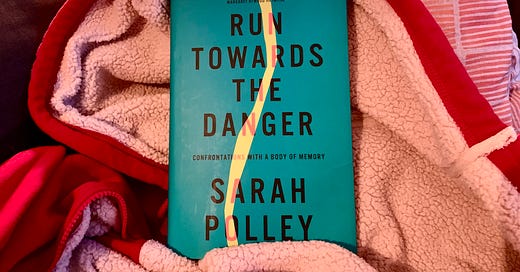In filmmaker and activist Sarah Polley’s first book of essays, Run Towards the Danger, she writes about her upsetting, degrading, painful, and frightening sexual encounter with Jian Ghomeshi, and her decision to stay silent when women began to come forward with accusations of assault against him.
Polley was thirteen years old the first time she met Ghomeshi and sixteen years old at the time of her alleged assault.
The reason she stayed silent in 2014, while more and more women came forward, she writes in an essay entitled The Woman Who Stayed Silent, is because she was counselled to stay silent—by nearly everyone she approached for legal advice.
Lawyer after lawyer told her that under no circumstance would they advise a woman they know and love to enter the criminal justice system in an attempt to hold a man accountable to his predatory behaviour.
Other factors were also at play in Polley’s decision not to speak up. On top of the lawyers’ advice, she had her infant children to think about, her patchy memory of the incident to consider, and nearly two decades post-alleged assault of documented and ongoing friendly behaviour with Ghomeshi.
In order to not ruffle any feathers—professionally or internally—Polley minimized and normalized what Ghomeshi did to her, putting her story into a box labelled “Worst First Date Ever” and storing it away only to be brought out at parties for laughs over cocktails.
One party, after telling the story for the umpteenth time, Polley realized that not all the pieces made it into the box and that she’d been sharing her experience as an anecdote to avoid the deeper truth. Thus began her journey of unravelling and contemplating the consequences of speaking up.
What have we been willing to accept that is deeply unacceptable?
I remember in 2017 when #MeToo took off, looking back on my sexual experiences with fresh eyes. A word I’d never tasted in my mouth before—rape—bubbled up the back of my throat and asked if it was alright to come out.
It didn’t. Either because I wasn’t brave enough or because it wasn’t true. There are legal definitions of actions and then there are lived experiences. Lived experiences don’t fit into neat little boxes or translate into clear definitions.
Consent is a moving target. Or not a target. But a living, breathing thing. Something that can’t be nailed down or pointed at—There! You gave it, so it belongs to me now.
Consent can be given and then taken away. Truly, consent only exists in the present moment. Which is a difficult thing for many, including our justice system, to understand.
When #MeToo broke the New York Times asked Polley to write an op-ed. In 2017, before her admission about Jian Gomeshi, she wrote,
I hope that the ways in which women are degraded, both obvious and subtle, begin to seem like a thing of the past. For that to happen, I think we need to look at what scares us the most. We need to look at ourselves. What have we been willing to accept, out of fear, helplessness, a sense that things can’t be changed?
What else are we turning a blind eye to, in all aspects of our lives? What else have we accepted that, somewhere within us, we know is deeply unacceptable? And what, now, will we do about it?
What have we been willing to accept that is deeply unacceptable? And what, now, will we do about it? Or, in the words of our justice system, What is measured and what is owed?
Can we achieve reparations for the harm caused? Can we change the culture so the harm does not continue?
There are incremental, ongoing, linear changes happening everywhere, everyday—in our so-called “justice” system, in our governmental systems and their bureaucracies, and in our selves.
Maybe one day we will live in a world where lawyers convince their friends to seek justice within the system they’ve dedicated their lives to.
Or maybe we’ll build different systems where justice is easier to come by so we can one day live in a world where justice does not need to be sought at all.
“That’s just the way things are” is a false statement. There is no “way things are.”
Change is, was, and always will be the only constant. It is what it is right now. But it doesn’t have to be.



